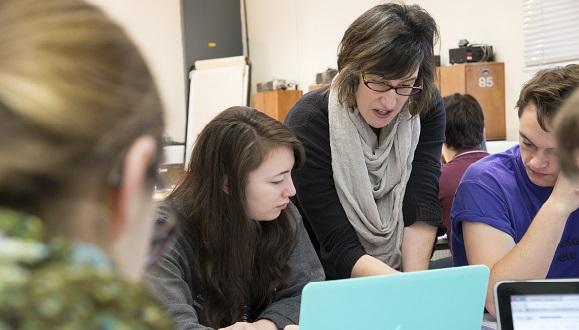My NTF award is based on my contributions to three interlinked areas: interdisciplinarity in science education, employability and sustainability. During my career my teaching philosophy has evolved to recognise importance of supporting student subject and skills development within science curricula: “not just teaching science but creating scientists, focusing on areas such as skills articulation, flipped learning and open- ended laboratory investigation.
My journey to NTF really started with my decision to focus on teaching career within higher education following posts as bench scientist doing research. I loved research, but loved enthusing about it and supporting the development of junior scientists even more. From the start of my teaching career I have been driven by my desire to apply the same approach that I used in my scientific research to understanding teaching, namely that my teaching (and laterally the teaching I have led) should be informed by the body of published literature, discussions with more experienced colleagues and observation.

At the start of my teaching-focused career I was inexperienced (but enthusiastic!), but was hugely fortunate to encounter some truly inspirational colleagues during my career (many of them NTFs) and to have received fantastic support from my institution (University of Leicester) in the form of training (PGCAPP), communities of practice (including annual teaching conferences), awards recognising teaching excellence and financial support to attend external conferences.
This support has allowed me to develop as an educator and take on additional responsibilities including developing curricula, establishing local SoTL groups, directing degree programmes and leading University initiatives to embed Education for Sustainable Development (ESD) across our institutional educational offering.
Transferable skills in science degrees
I firmly believe that we need to challenge ourselves as educators to ensure that we are designing curricula that not only deliver content but also provide opportunities to develop key graduate skills appropriate to non-academic employments.
With this in mind I have conducted a six-year longitudinal study to assess if there are measurable benefits in transferable skills from the use of authentic assessments as part of our interdisciplinary, problem-based, Natural Sciences degree. My research has shown that this approach supports the development of professional skills, that students recognise the importance of these attributes and have confidence that the programme provides them.
Of particular interest were the increased confidence levels in implicit skills which are difficult to “teach” but can be developed through Problem-based Learning, such as independent learning, project management and problem-solving. Alumni interviewed as part of this research were all able to identify transferable skills developed on the programme they had used in further study or the workplace. In addition, further data I collected revealed that students developed increasingly expert attitudes towards biology and chemistry. Together these findings demonstrate that a Problem-Based Learning approach can be successful in both in developing transferable skills whilst also developing discipline expertise, providing one means to achieve skills development alongside subject expertise.
Education for Sustainable Development (ESD)
My award also recognises my work leading ESD at the University of Leicester. This is an area of increasing importance and relevance; our graduates will face significant issues related to environmental and social justice during their lifetimes. ESD is an essential tool for achieving sustainability by teaching students about these issues and equipping graduates with the problem-solving skills necessary to deal with the sustainability challenges that the world faces now and in the future. National and institutional data also show this is an area that students increasingly rate as important and that there is strong appetite for sustainability to be taught within curricula.
The University of Leicester’s Climate Change Strategy includes education-related commitments with the overall aim for all students to have the opportunity to learn about climate change and sustainable development, regardless of subject or level studied, and to develop the awareness and skills to deal with these challenges as socially responsible global citizens. I’m really proud of the work I have led which has resulted in 98% of our undergraduate courses delivering teaching aligned with United Nations sustainable Development Goals.
Receiving this award is a huge honour, and I’m really proud to be entering a community of practitioners I have looked up to for many years. I hope that the opportunities that come with being an NTF will allow me to have increasing involvement in initiatives supporting the development of new academics and communities of practice for teaching-focused staff. In addition I hope I can use the opportunity to disseminate my practice, and to support STEM academics and programmes, nationally and internationally.
Dr Sarah Gretton is an Associate Professor, and Director of the Natural Sciences programme and institutional lead for Education of Sustainable Development at the University of Leicester. Sarah has a research background in virology; her current educational research interests include sustainability, skills development and interdisciplinary science education. Sarah was awarded a University Teaching Fellowship in 2014, and was both a finalist for HE Bioscience Teacher of the Year and EAUC Green Gown Award for Sustainability Champion in 2017. She led the University of Leicester’s winning Collaborative Award for Teaching Excellence (CATE) submission in 2017 and was awarded a National Teaching Fellowship in 2021.
Find out more about the 2021 winners of the National Teaching Fellowship Scheme and Collaborative Award for Teaching Excellence.